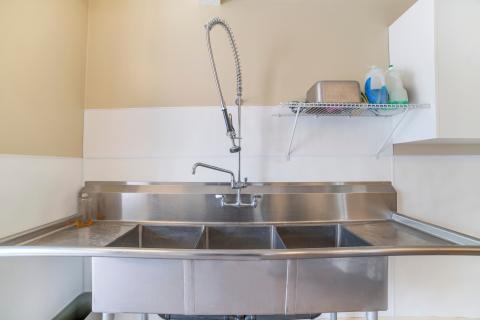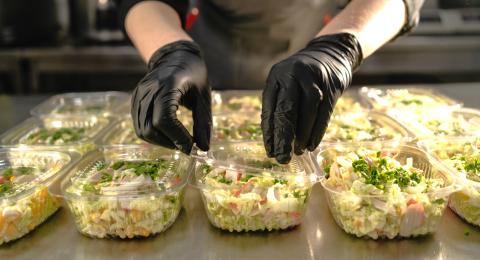When is a Commercial Kitchen Food License Required?
Starting a homestead food business is a dream of many home cooks. Beginning small, in your primary home kitchen, with shelf-stable baked goods and other approved foods is a practical way to try out this venture.
There are some food safety and legal requirements that will help to create a delicious and safe product. This fact sheet, developed from New Hampshire Food Protection Section guidance, can help to get you started. In Parts One and Two you learned about the kinds of foods you can make and sell in your home kitchen. In this fact sheet, we will discuss the kinds of foods that require a commercial kitchen.
You will need a food processing license to sell the following foods at a Farmers Market or if you sell wholesale to restaurants from NH DHHS Food Protection or self-inspecting city or town. You will also need access to a commercial kitchen to make and sell these food products:
- See list from The Basics - Part One, “What foods am I prohibited from making in a homestead kitchen?” If you have questions about specific foods, contact NH DHHS Food Protection: dhhs.foodprotection@dhhs.nh.gov or 603-271-4589
- Fermented foods – sauerkraut, kimchi. Fermented foods need a process review prior to being made and sold. (See Note #1)
- Special processes – dehydration of food. Dehydrated foods need a process review prior to being made and sold. (See Note #1)
Exception: drying herbs is permitted as a homestead product. Dehydrated mushrooms is not allowed as it is not considered to be an herb. - Refrigerated foods or foods requiring Time/Temperature Control for safety (TCS foods) including cheesecake, sandwiches, salads, soups, etc.
- Freeze dried TCS foods, such as ice cream.
Note #1 Process Review
Process reviews are required for processed or jarred foods using your own recipe and not the exact recipe, jars, or process from the National Center for Home Food Preservation. The food processing authority declares in writing whether there are biological food safety concerns with the food. Food products that have a pH below 4.6 or a water activity below 0.85 can be produced in the homestead.
A list of food processing authorities is available from the New Hampshire Food Protection website section on food processing https://www.dhhs.nh.gov/programs-services/environmental-health-and-you/food-protection/food-processing-plants in the Frequently Asked Questions (FAQ) section.
Did you know?
Due to zoning and other rules, some self-inspecting cities and towns do not allow food-based home businesses.

Commercial Kitchen Requirements
- Commercial refrigeration
- 3-bay sink to wash, rinse, and sanitize equipment
- Separate food prep sink
- At least one hand washing sink
- Mop sink
- Floors, walls, and ceilings are required to be smooth, durable, non-absorbent, and easily cleanable

Commercial Kitchen License Requirements
- Water test results for bacteria, nitrates, nitrites
- Septic documentation, including approval for construction and approval for operation
- If the facility is new, then floor plans are required to be submitted for a plan review prior to construction
- Process reviews are required for acidified foods or other “canned” foods. A Hazard Analysis Critical Control Point (HACCP) plan is required if you have a food processing plant license, but it is not required if the retail store already has a food preparation license.
Additional FDA Requirements for Acidified Foods Made in a Commercial Kitchen
- Processors of acidified foods are required to attend and satisfactorily complete a Better Process Control School (BPCS) for acidified foods.
- In addition to the BPCS, manufacturers of acidified foods are required to file and register their scheduled processes with the FDA.
A scheduled process is the steps and controls you use to manufacture a food that will not permit the growth of foodborne illness causing microorganisms.
NH Food Protection has a detailed information on these FDA requirements (Scroll to FAQs section): https://www.dhhs.nh.gov/programs-services/environmental-health-and-you/food-protection/food-processing-plants
Important Information:
If you are planning a new facility, you will need to submit water test results, septic approval and floor plans for commercial kitchen license requirements.
Food Processing Including Licensing, Food Processing Authorities, and FAQs
https://www.dhhs.nh.gov/programs-services/environmental-health-and-you/food-protection/food-processing-plants
Floor Plan Review
https://www.dhhs.nh.gov/programs-services/environmental-health-and-you/food-protection/submit-floor-plan-review
HACCP Principles & Application Guidelines
https://www.fda.gov/food/hazard-analysis-critical-control-point-haccp/haccp-principles-application-guidelines
Homestead Food Operations
https://www.dhhs.nh.gov/programs-services/environmental-health-and-you/food-protection/homestead-food-operations
New Hampshire He-P 2300 Sanitary Production and Distribution of Food
http://www.gencourt.state.nh.us/rules/state_agencies/he-p2300.html
NH DHHS Food Protection
dhhs.foodprotection@dhhs.nh.gov, 603-271-4589
https://www.dhhs.nh.gov/programs-services/environmental-health-and-you/food-protection
NH Liquor Commission (for kombucha)
https://www.nh.gov/liquor/enforcement/contact-us/index.htm
NH Self-Inspecting Cities & Towns
https://www.dhhs.nh.gov/sites/g/files/ehbemt476/files/documents/2021-11/fp-selfinspect.pdf
NH DHHS Food Protection Beverage Licensing (i.e., Cold brew coffee)
https://www.dhhs.nh.gov/programs-services/environmental-health-and-you/food-protection/beverage-bottled-water-manufacturers
This work is supported by the Expanding the Reach of New Hampshire's Food Safety Education and FSMA Programs to Include Value Added Processors program, project award number 2018-70020-28876, from the U.S. Department of Agriculture’s National Institute of Food and Agriculture. Any opinions, findings, conclusions, or recommendations expressed in this publication are those of the author(s) and should not be construed to represent any official USDA or U.S. Government determination or policy.
Created: July 2020
Updated: January 2025
Special appreciation to Royann Bossidy of the NH Food Protection Section for her insights and guidance in putting together this fact sheet series.


